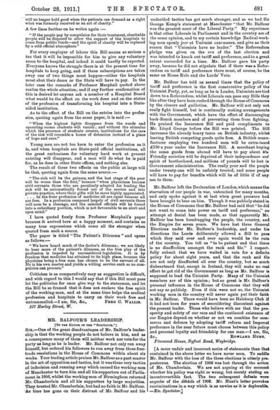MR. BALFOUR'S LEADERSHIP.
(To THZ EDITOR 01 THZ " SPECTATOR." j Sin,—One of the great disadvantages of Mr. Balfour's leader- ship is that the working people do not believe in him, and as a consequence many of them will neither work nor vote for the party as long as he is leader. Mr. Balfour not only ran away himself, but ordered his followers to run away from three free- trade resolutions in the House of Commons within about six weeks. Your leading article praises Mr. Balfour as a past master in the art of opposition and tactics, but it was these very tactics of indecision and running away which caused the working men of Manchester to turn him and all his supporters out of Parlia- ment in 1906, whilst the working men of Birmingham returned Mr. Chamberlain and all his supporters by large majorities. They trusted Mr. Chamberlain, but had no faith in Mr. Balfour. As time has gone on their distrust of Mr. Balfour and his undecided tactics has got much stronger, and so we had Sir George Kemp's statement at Manchester "that Mr. Balfour was the greatest asset of the Liberal Party." My experience is that other Liberals in Parliament and in the country are of the same opinion, and to my certain knowledge Radical work- ing men openly jeer at Unionist canvassers, and give as their reason that " Unionists have no leader." The Referendum pledge was given on the eve of the last election and was intended to knock out tariff and preference, and to a great extent succeeded for a time. Mr. Balfour gave his party away, because he did not stipulate that if there was a Refer- endum on tariff and preference there must, of course, be the same on Home Rule and the Lords' Veto.
Mr. Balfour has told us several times that the policy of tariff and preference is the first constructive policy of the Unionist Party, yet, so long as he is Leader, Unionists are tied down to a Referendum, whilst Liberals can pass any Bills they like after they have been rushed through the House of Commons by the closure and guillotine. Mr. Balfour will not only not really fight himself, but is continually making arrangements with the Government, which have the effect of discouraging back-Bench members and of preventing them from fighting. He praised the Insurance Bill and paid compliments to Mr. Lloyd George before the Bill was printed. The Bill increases the already heavy taxes on British industry, whilst leaving British competing goods quite free. A British manu- facturer employing two hundred men will be extra-taxed £130 a year under the Insurance Bill. A merchant buying the same goods from abroad will have to pay about 40s Friendly societies will be deprived of their independence and spirit of brotherhood, and millions of pounds will be lost in Government administration. The really poor and the people under twenty-one will be unfairly treated, and some people will have to pay for benefits which will be of little if of any use to them.
Mr. Balfour left the Declaration of London, which means the starvation of our people in war, untouched for many months, and only spoke against it at last when great pressure had been brought to bear on him. Though it was publicly stated in the House of Commons that Mr. Balfour had said that "he did not want to come into power on tariff and preference," no attempt at denial has been made, so that apparently Mr. Balfour has been humbugging the people, the country, and the Empire for seven years. We have lost three General Elections under Mr. Balfour's leadership, and under his directions the Lords deliberately allowed a Bill to pass which they said over and over again would be the ruin of the country. You tell us " to be patient and that there is no disaffection amongst the rank and file." I respect- fully submit that we have waited in vain for a definite policy for about eight years, and that the rank and file are not only disaffected all over the country, but so much disheartened that, except in Ireland, they will make no real effort to get rid of the Government as long as Mr. Balfour is supposed to lead the Unionist Party. Many of the Unionist members are of this opinion ; but so great is Mr. Balfour's personal influence in the House of Commons that they will not say so publicly. Even if this were not so, the Unionist working men in the country will never again put their faith in Mr. Balfour. There would have been no Salsbury Club if it had not been for years of smouldering discontent against the present leader. Those who believe with me that the pro- sperity and safety of our race and the continued existence of our Empire depend on whether or not we combine for com- merce and defence by adopting tariff reform and Imperial preference in the near future must choose between this policy and personal loyalty and friendship for one man.—I am, Sir, Pinewood House, Bypet Road, Weybridge.
[A more unfair and incorrect series of statements than that contained in the above letter we have never seen. To saddle Mr. Balfour with the loss of the three elections is utterly pre- posterous. The election of 1906 was lost through the action of Mr. Chamberlain. We are not arguing at the moment whether his policy was right or wrong, but merely stating an incontrovertible fact. The two subsequent defeats were sequelai of the debdcle of 1906. Mr. Hunt's letter provokes recriminations in a way which is as unwise as it is deplorable. —ED. Spectator.)










































 Previous page
Previous page